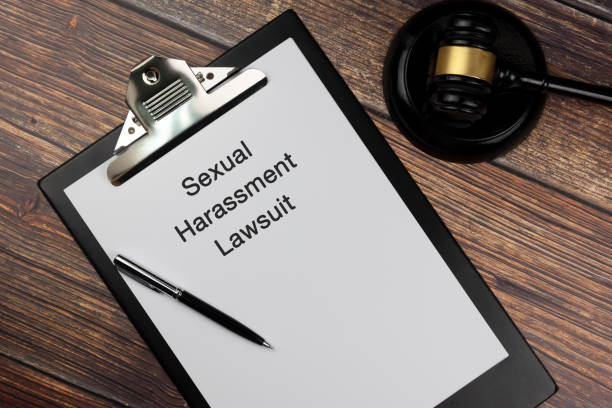
Employer wont believe employees sexual harassment complaint?
According to the Australian Human Rights Commission, less than a third (32%) of people who experience sexual harassment at work make a formal complaint or disclose the event. Then a portion who do complain are swept aside and ignored by a toxic employer.
This behaviour is not okay, nor is it legal in most circumstances. Employers have a duty to protect their employees and respond appropriately to serious complaints. Per the amended Sex Discrimination Act 1984 (Cth), the onus is on the employer to implement reasonable steps to prevent sexual harassment and a toxic workplace.
We would argue if a person comes forward with a complaint they should be given benefit of the doubt and expect that their complaint is genuine. And that is how it stays until proven, investigated, or otherwise. The employer should not automatically dismiss the employee or assume their own vicarious liability. i.e. “what will this cost us”.
This article explains what it means when an employer wont believe employees, why they might be ignored or not believed in, and what an employee can do as a result.
Employer thinks I’m falsely accusing someone
Sexual harassment can be a difficult event to live through. Employees and victims will have a multitude of reactions and symptoms from being sexually harassed. In almost all events an employee will be told to inform their employer or their superior if they are being harassed or discriminated against. This is done to ensure the company can take reasonable steps to prevent further harassment and decide upon disciplinary action.
However, in some circumstances the employer wont believe employee in their complaint. As a society there can be a victim blaming response to sexual harassment. That the victim was at fault as they did something to provoke the perpetrator, that they are lying, or that the experience “wasn’t that bad”.
Unfortunately, the toxic victim blaming attitude has plagued the workplace and employers can have similar responses. Outside of a victim blaming mentality, there are multiple other reasons why an employer may not take an employee’s complaint seriously.

The usual reaction
Once a serious complaint has been made it is within the employer’s responsibility to investigate. Legally they are not allowed to dismiss the complaint without an investigation as to the circumstances.
This is aligned with the employer’s responsibility to ensure there are reasonable preventative steps to minimise the opportunity for sexual harassment. Investigations, besides for disciplinary purposes, can help employers identify areas for improvement.
Reputational harm
Unfortunately, some employers will ignore complaints or conversations of sexual harassment due to a myriad of issues. They may be afraid of reputational damage, it is usually costly to run an investigation, they do not want to be in a position where they have to reprimand a staff member, or there are issues with Human Resources.
Some workplaces fear for their reputational damage if it were to be found out someone was sexually harassed in their workplace. Especially as there has been a recent change towards the attitude of employers and how they respond to sexual harassment.
They are now treated more critically and sanctioned as much. Rather than resolving the issue or root cause of the problem, some employers will try to silence the victim to minimise how many people know within the company. Some toxic employers will have their employees sign an NDA (Non Disclosure Agreement) or threaten their employees.
Find out why Non Disclosure Agreements are harmful.

Employer believes employees are not worth the cost
Depending on the severity of the complaint, some investigations can cost thousands. Each investigation will look slightly different depending on the needs of the company and the complaint itself. However, there are some common practices that employers can preemptively prepare for.
For example, it is common for either the victim, perpetrator, or both, to be suspended with pay during the course of the investigation. This is to ensure that neither employee comes in contact with each other, as their relationship would be sensitive and probably highly uncomfortable. Furthermore, neither party would have a chance to alter the course of the investigation if there are allegiances within the company.
Furthermore, for more severe instances of sexual harassment where there may be long standing history, or many individual involved, a third party investigator may be necessary. This would also reduce the chance of unfair bias from the investigation decision maker on who is lying or telling the truth.
External investigators can be particularly expensive, often working at an hourly rate. For more time consuming investigations they can easily cost thousands of dollars.

Furthermore, the company must consider the time component of an investigation. There should not be any unnecessary time wasted in conducting an investigation. However, employees will have to take time out of their day to be questioned, footage (if available) will have to be combed through, all other evidence will be considered, and a decision will have to be decided on. Employers will consider how much labour will be lost to an investigation.
All things said, it is within an employer’s best interest to complete a thorough and fair investigation while they have the opportunity. The initial cost may not seem “worth it”, however the cost of having to go to trial due to the employer’s laziness will be guaranteed to be more expensive. Therefore, employer’s are incentivised to complete their due diligence now.
Is HR the problem?
There is a stigma and almost universal “workplace joke” that all Human Resource (HR) employees are evil and hate employees. However, the Human Resources department may be somewhat complicit in why some complaints are not thoroughly investigated or ignored altogether.
In some instances the employees who work in HR may not be qualified or experienced enough to manage e a sexual harassment complaint. In that case, that is why it is imperative that there are clear procedures and experienced staff members at all times.
In other cases, there are unfortunate circumstances where HR will use their discretion and argue that the complaint is not compelling enough to investigate or make up other excuses. In that case, employees are urged to try and complain to upper management or someone outside of the HR team if the employee believes they are not addressing the matter appropriately.
It is imperative that HR employees are chosen with care and attention. They can act as either an inhibitor or supporter in times of sexual harassment or other serious complaints. The employer must trust that their HR staff are performing within their legal duties in order to avoid being sued.

What to do next?
How an employee responds to their complaints being ignored or not believed depends on the employee themselves. No matter how the employee chooses to respond, it is recommended to seek professional objective advice.
It is easy to disbelieve one’s own experiences and concerns when it feels like no one else believes in them too. To be completely sure, always speak to a professional to receive genuine and objective advice and answers. Especially if an employee cannot trust their workplace or people around them.
The first step is to always try to complain or disclose to alternative routes within the company. In some cases this may be possible, particularly for large businesses or one with multiple senior members with authority.
By sorting through the issue internally there is usually more flexibility in how to resolve the issue, there are no out of pocket costs, and change can be implemented quickly. However, this is not always going to be an option, especially for smaller, more linear companies.
Fair Work fighting for your rights

If there is no way to resolve the matter internally, the usual next step is to resolve the matter through the Fair Work Commission or state administrative tribunal. The Fair Work Commission allows for a structured way to resolve issues that are more affordable, and faster, than any formal court process.
There are two options for employees who are still working at their workplace; a General Protection application or a Stop Sexual Harassment Order. Before lodging a Fair Work claim it is necessary to recognise that there may be a break down of the formal relationship between the employee and employer. This is not guaranteed, however some employees may find it difficult to return to the same workplace.
There are key differences between the two claims. A General Protections application focuses on how an employee has exercised their workplace right, and as a result how has their employer retaliated against them. There is also a larger encompassing focus on discrimination, and sex discrimination, rather than sexual harassment itself.
The claim also allows for a plethora of outcomes depending on whether the employee wishes to stay or leave the company. Some wish to stay and be moved to a different team or agree to a different arrangement. Others prefer to leave and seek some financial compensation.
A Stop Sexual Harassment Order is less flexible and only deals wit the sexual harassment itself. There is no opportunity to bring surrounding issues, nor can an employee ask for financial compensation. However, it does allow an employee safeguarding if the sexual harassment continues as it shows that they have done everything in their power to resolve the issue. And the employer can be further criticised and sued for allowing the issue to persist.

Female employee complaints ignored by multiple managers
In the case of Evans v Pasadena Foodland and Crugnale [2019] SAET 222, a female employee was working at a supermarket with a male manager from a different department. The male coworker had started to create a pattern of sexually harassing the female employee over three instances. This would include bruising past her very closely so their bodies would be touching, allowing him to place his hands on her buttocks.
The female employee had complained to management of the sexual harassment she had been experiencing. She complained to both the assistant store manager and HR manager. However, when they reviewed the CCTV footage management had told her they saw “nothing of concern”.
Neither manager took the complaint seriously. The female employee was not asked for a formal statement or assist in the matter any further. With the HR manager failing to escalate the matter it seems that there were no further actions taken as far as an ‘investigation’ was concerned.
Furthermore, the CCTV footage that was originally viewed was allowed to be automatically destroyed two weeks after the female employee complained.
The female employee did not try to raise her complaints again until a few months after her last experience of sexual harassment. However, her complaints were to a different manager, who escalated the matter into a full investigation. The outcome was an apology.
Due to the lack of action and enforcement of the rules the female employee had decided to raise her claim to the police and South Australian Employment Tribunal. The female employee claimed that the male coworker sexually harassed her. And that her employer, Pasadena Foodland, had been vicariously liable. Allowing the sexual harassment to occur as they did not enforce their own sexual harassmet policies.

South Australian Tribunal supports victims
The Tribunal had supported the female employee in her claim. Reaching to the conclusion that the female employee was sexually harassed and her employer was vicariously liable. That they had not implemented their own policies or taken preventative steps to protect against sexual harassment.
The female employee was awarded $30,000 in general damages. One part was due to the psychological damage she had experienced through the ordeal. The female employee had worked at the establishment for approximately 7 years prior to lodging her claim, and earned some finances due to loss of earnings.
Ultimately all employees are entitled to complain about sexual harassment and be heard by their employers.
Conclusion to employers not believing employee complaints
Some of the pictures show finger pointing by males, this is a mechanism to bully you and for you to doubt yourself. Some employers will be physically dominant to subtly – or sometimes not subtly – reduce employees confident and self worth.
If your employer wont believe you then we will make sure they not only believe but hear you loud and clear. Even the most quiet employees should be given the benefit of the doubt until a thorough and fair investigation can be completed.
Toxic employers wont believe employee complaints
Sexual Harassment Australia will help you stand against harassment and toxic employers to protect and empower yourself. You have the right to work in a safe and comfortable workplace. We have helped thousands over our 25 years working with victims. Recently we have been featured in the Herald Sun and other reputable sources. Don’t just take our word for it – let us show you our outstanding quality and professionalism.
If you are unsure if you are a victim or how to move forward let us help you. All information that you provide us will stay confidential. Whether you are suffering from harassment, bullying, or discrimination we will always try to help.
Contact us at 1800 333 666 or email mediate@awna.com.au now for a free consultation.












